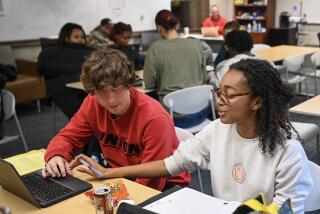Cheaters Hurt Everyone, in School and Afterward
- Share via
There seems to be overwhelming agreement that schools and teachers should play a major role in establishing honest environments. And responses to my previous column on the topic affirm that cheating isn’t limited to students. But let’s say that schools do all they can to ensure integrity and there are still students who cheat. How do we respond?
Some insist that “cheaters hurt no one but themselves,” so we can basically write them off. Though that may be a comforting thought, it is simply not true. There are countless ways that cheaters hurt others.
In the immediate sense, their behavior affects any class where the teacher grades on the curve. If cheating didn’t pay off, no one would do it. Students who get the tests ahead of time or bring elaborate “cheat sheets” to the exam do get higher grades because they set the curve; the students who really do study may see their grades drop.
Once out of high school, those who cheat may go right on hurting people. If they got into college under false pretenses, they may need to cheat to stay in and then to get into a prestigious business school or law school. Then they may have to fake their way into a career. I even know of a young man who plagiarized a major college project to get into divinity school.
It may be a shock to the uninitiated to learn how far students will go to get the high grades they see as essential for admission to the right university. The following examples are from my personal knowledge: a student breaking into a classroom at night to steal the teacher’s grade book; a school valedictorian “hacking” into a teacher’s computer to make copies of all the exams; a student offered $500 to take the SAT for another student; a student putting his name on a test after erasing the name of the person who had taken it; a student handing in a paper a college professor wrote; a student programming answers into a TI-85 calculator for a social science test; and, most recently, a student blatantly falsifying information on a University of California application.
Honest students are hurt by actions like that. Along with getting lower grades and seeing hard work devalued, they take a blow to their morale when they watch cheaters prospering. I’m not suggesting that honest students will abandon their ethics, but it’s got to be a struggle to keep their integrity when they are surrounded by people earning the same grades and getting into the same universities without doing the work.
With so many forces at work here, it’s tempting to point a finger of blame at the admissions office at Stanford or the creators of the SAT exam. Given the fact that those institutions aren’t likely to change any time soon, maybe we need to look a lot closer to home. Though some students are obsessively driven all on their own, the vast majority are desperate for good grades because that’s what their parents expect. There certainly is nothing wrong with wanting our children to do the best they can, but what if their best doesn’t warrant admission to Harvard? If a student has to cheat to get into the college of his choice, maybe he has chosen the wrong college. Worth is not determined just by grades or test scores or the schools people attend. It’s that simple.
If our Boalt Law School graduate uses illegal tactics in court, if our MBA from Stanford does some insider trading, if our elected official with a Princeton degree bankrupts a county, what has been gained? Clients and constituents must now pay the toll. People don’t suddenly change tactics when they reach the positions they cheated to get. Dishonesty has become their way of life.
Cheaters hurt others when they become our employers, our tax accountants, our city council members. We and our neighbors end up paying for her deceit
More to Read
Sign up for Essential California
The most important California stories and recommendations in your inbox every morning.
You may occasionally receive promotional content from the Los Angeles Times.













